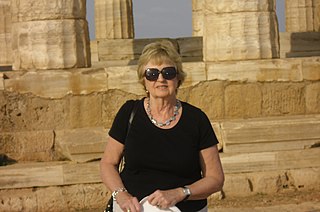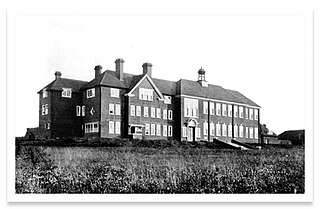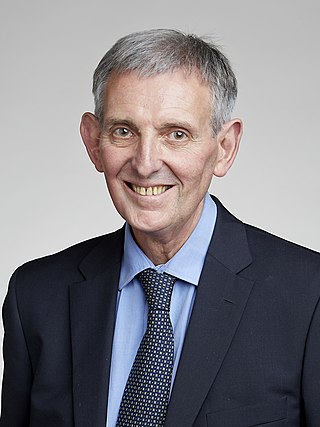Related Research Articles

Alan John Watson, Baron Watson of Richmond is a UK-based broadcaster, Liberal Democrat politician and leadership communications consultant.
Human error is an action that has been done but that was "not intended by the actor; not desired by a set of rules or an external observer; or that led the task or system outside its acceptable limits". Human error has been cited as a primary cause contributing factor in disasters and accidents in industries as diverse as nuclear power, aviation, space exploration, and medicine. Prevention of human error is generally seen as a major contributor to reliability and safety of (complex) systems. Human error is one of the many contributing causes of risk events.

Charles Wayne Rees CBE FRS FRSC was a British organic chemist.

Dame Averil Millicent Cameron, often cited as A. M. Cameron, is a British historian. She writes on Late Antiquity, Classics, and Byzantine Studies. She was Professor of Late Antique and Byzantine History at the University of Oxford, and the Warden of Keble College, Oxford, between 1994 and 2010.

The Swiss cheese model of accident causation is a model used in risk analysis and risk management, including aviation safety, engineering, healthcare, emergency service organizations, and as the principle behind layered security, as used in computer security and defense in depth. It likens human systems to multiple slices of Swiss cheese, which has randomly placed and sized holes in each slice, stacked side by side, in which the risk of a threat becoming a reality is mitigated by the differing layers and types of defenses which are "layered" behind each other. Therefore, in theory, lapses and weaknesses in one defense do not allow a risk to materialize, since other defenses also exist, to prevent a single point of failure. The model was originally formally propounded by James T. Reason of the University of Manchester, and has since gained widespread acceptance. It is sometimes called the "cumulative act effect".

Sir Cary Lynn Cooper, is an American-born British psychologist and 50th Anniversary Professor of Organizational Psychology and Health at the Manchester Business School, University of Manchester.

Farnham Grammar School is now called Farnham College which is located in Farnham, Surrey, southern England.
David John Finney, was a British statistician and Professor Emeritus of Statistics at the University of Edinburgh. He was Director of the Agricultural Research Council's Unit of Statistics from 1954 to 1984 and a former President of the Royal Statistical Society and of the Biometric Society. He was a pioneer in the development of systematic monitoring of drugs for detection of adverse reactions. He turned 100 in January 2017 and died on 12 November 2018 at the age of 101 following a short illness.
The healthcare error proliferation model is an adaptation of James Reason’s Swiss Cheese Model designed to illustrate the complexity inherent in the contemporary healthcare delivery system and the attribution of human error within these systems. The healthcare error proliferation model explains the etiology of error and the sequence of events typically leading to adverse outcomes. This model emphasizes the role organizational and external cultures contribute to error identification, prevention, mitigation, and defense construction.
David Michael Garrood Newbery, CBE, FBA, is a British economist who has been Professor of Applied Economics at the University of Cambridge since 1988. He specialises in the field of energy economics, and he writes on the regulation of electricity markets. His interests also include climate change mitigation and environmental policy, privatisation, and risk.

Linda Jane Pauline Woodhead is a British sociologist of religion and scholar of religious studies at King's College London Faculty of Arts and Humanities. She is best known for her work on religious change since the 1980s, and for initiating public debates about faith. She has been described by Matthew Taylor, head of the Royal Society of Arts, as "one of the world's leading experts on religion".
Sir Peter Julius Lachmann was a British immunologist, specialising in the study of the complement system. He was emeritus Sheila Joan Smith Professor of Immunology at the University of Cambridge, a fellow of Christ's College, Cambridge and honorary fellow of Trinity College, Cambridge and of Imperial College. He was knighted for service to medical science in 2002.
Peter James Marshall is a British historian known for his work on the British Empire, particularly the activities of British East India Company servants in 18th-century Bengal, and also the history of British involvement in North America during the same period. He is not to be confused with his contemporary, the other P. J. Marshall, who chronicled the history of public transport in the British Isles.
Maritime resource management (MRM) or bridge resource management (BRM) is a set of human factors and soft skills training aimed at the maritime industry. The MRM training programme was launched in 1993 – at that time under the name bridge resource management – and aims at preventing accidents at sea caused by human error.
Ivan de Burgh Daly was a British experimental physiologist and animal physiologist who had a specialist knowledge of ECG use and was awarded a Beit Fellowship in this field in 1920. Together with Shellshear, he was the first in England to use thermionic valves in any biological context. In 1948, he was instrumental in the foundation of the Babraham Institute at the University of Cambridge. He was a leading authority on pulmonary and bronchial systems.

David Alastair Standish Compston is a British neurologist. He is an emeritus professor of neurology in the Department of Clinical Neurosciences at the University of Cambridge and an emeritus fellow of Jesus College, Cambridge.

David John Webb, is a British physician, scientist and clinical pharmacologist, who currently holds the Christison Chair of Therapeutics and Clinical Pharmacology at the University of Edinburgh.
Sarah Elizabeth Curtis, is a British geographer and academic, specialising in health geography. From 2006 to 2016, she was Professor of Health and Risk at Durham University; she is now professor emeritus. A graduate of St Hilda's College, Oxford, she was Director of the Institute of Hazard Risk and Resilience at Durham between 2012 and 2016. She previously researched and taught at the University of Kent and at Queen Mary, University of London.
Anne Mary Hudson, was a British literary historian and academic. She was a Fellow of Lady Margaret Hall, Oxford from 1963 to 2003, and Professor of Medieval English at the University of Oxford from 1989 to 2003.
Just culture is a concept related to systems thinking which emphasizes that mistakes are generally a product of faulty organizational cultures, rather than solely brought about by the person or persons directly involved. In a just culture, after an incident, the question asked is, "What went wrong?" rather than "Who caused the problem?". A just culture is the opposite of a blame culture. A just culture is not the same as a no-blame culture as individuals may still be held accountable for their misconduct or negligence.
References
- ↑ Sumwait, Robert L. (1 May 2018). "The Age of Reason". NTSB Safety Compass. Archived from the original on 18 December 2020. Retrieved 21 February 2024.
- 1 2 Reason, James (1990). Human Error. Cambridge, England: Cambridge University Press. ISBN 978-0-521-30669-0.
- ↑ Reason, James T. (1997). Managing the Risks of Organizational Accidents. Farnham, England: Ashgate Publishing. ISBN 978-1-84014-105-4.
- ↑ Reason, James (2013). A Life in Error: From Little Slips to Big Disasters. Farnham, England and Burlington, Vt.: Ashgate Publishing. ISBN 9781472418432.